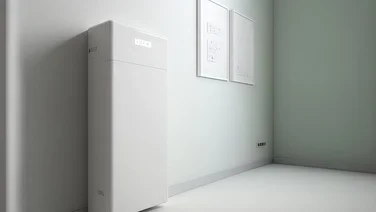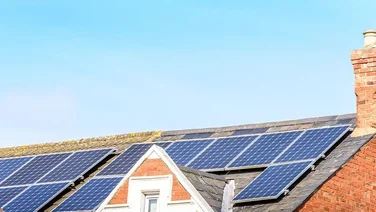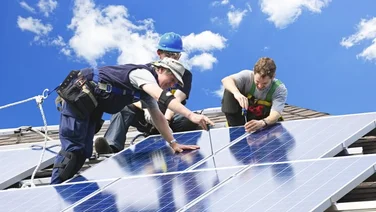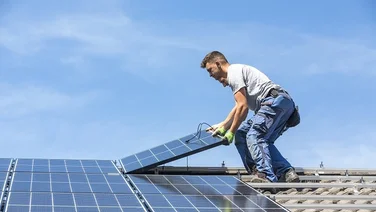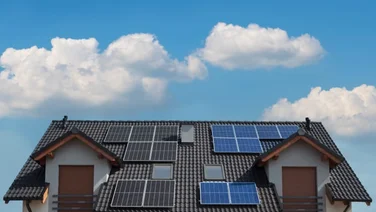We receive a small fee from trusted installers when you request a quote through our site. This helps us keep our content independent, well-researched and up to date – Learn more
- Solar leasing means you pay a fixed monthly fee to use the electricity solar panels generate
- You sign a long-term lease (typically 20–25 years), during which the provider handles installation, maintenance, and repairs while you benefit from reduced energy bills
- This setup has no upfront cost, manageable monthly payments, hassle-free maintenance, and immediate access to solar energy savings.

Switching to solar energy is an increasingly popular way to cut electricity bills and reduce your environmental footprint. However, if the upfront cost of solar panels is too much or if you don’t qualify for a government grant, leasing may offer a more affordable entry point.
Leasing solar panels allows you to enjoy the benefits of renewable energy without the financial burden of ownership. This means you can benefit from solar power while avoiding other ongoing costs, such as maintenance, over time, which is beneficial.
What is solar leasing?
As the name suggests, solar panel leasing means a company installs and owns panels on your property while you pay a monthly fee to use the electricity they generate. This means you avoid upfront costs and the expense of maintaining the panels.
However, this also means you don’t own the system or benefit from incentives like tax credits. You also tend to sign up for longer commitments, with leases typically lasting 20 to 25 years (though they do vary).
That said, you will benefit from fixed or predictably increasing monthly payments that remain consistent over time. Generally speaking, the leasing company handles issues such as maintenance, repairs, and upgrades, making it a hands-off approach compared to personally owning panels.
Leasing can lead to net savings if your lease payments are lower than your regular energy bills, but buying panels may offer greater long-term savings and full control over your energy use. Ownership also adds value to your property without the complications of transferring a lease to a future buyer.
Depending on the terms of the lease, once the term is up, you may have the option to buy the system, renew the agreement, or have the panels removed.
Will I save money with solar leasing?
Yes, certainly in the short term. As we’ve previously mentioned, leasing solar panels offers short-term savings by eliminating upfront costs and providing predictable monthly payments.
This makes it an appealing option for households seeking to lower their energy bills without incurring debt. However, while leasing is financially easier to access, it is possible that the total cost over 20–25 years could add up to more than the price of buying the system outright.
When you consider that the typical solar system will set you back between £7,000 and £8,000, leasing might just be more appealing to you as it also offers long-term financial benefits. This includes outright ownership of the equipment, access to government subsidies, and the potential to enhance property value.
In fact, in most cases, the initial investment can be recouped in less than a decade, after which it yields pure profit (excluding maintenance costs, of course). That said, ultimately, leasing will likely still save you money compared to doing nothing, especially if your lease payments are consistently lower than your utility bills.
Pros and cons of solar leasing
- No upfront costs
- Maintenance and repairs included
- Access to the latest technology
- Immediate energy savings
- Lower carbon footprint
- Long-term costs
- Limited ownership
- Performance risk – You must pay even if the system underperforms, limiting your expected savings.
- Complicated contracts
- No access to solar incentives
- Potential moving or house sale complications
- Limited flexibility
Which companies offer solar leasing?
When it comes to domestic solar panel leasing, some of the big players in the UK include, but are not limited to:
- Project Solar – The biggest solar panel installer in the UK offers solar panel leasing, with monthly payments for as little as £75.
- Puraflow – Offers a wide range of payment options, including leasing. The lease option offers flexible terms between 5 and 25 years.
- Otovo – Offers a subscription model where homeowners can install solar panels for a monthly fee, with ownership transferring after 20 years.
- The Solar People – Offers solar panel leases with zero upfront costs, enabling homeowners to spread repayments over many years.
- Sunsave – Provides a 20-year finance package for solar panels, including servicing and battery replacement, allowing customers to spread the cost over time.
- Octopus Energy – Offers a ‘buy-now-pay-later’ kind of system for solar panels. Since this isn’t technical “leasing,” we’ve just included it here to give you a wider idea of options out there.
If we are talking commercial solar panel leasing, you can look into companies like:
- WestWon – Specializes in leasing solar panels for businesses, offering terms ranging from 1 to 5 years to help preserve cash flow.
- Solar Dynamics – Provides commercial solar panels on finance across the UK, offering options like asset finance or sale and leaseback to make solar panels more accessible.
If you have a lot of land handy, you can also consider the following:
- Lightsource bp – Partners with landowners to lease land for solar farm development, providing a predictable, long-term revenue stream.
- Belltown Power – Engages with landowners to lease land for solar farm projects, offering competitive rental income and community benefits.
Can I use the Smart Export Guarantee if I lease solar panels?
Yes, depending on your specific lease agreement you could be eligible to use the Smart Export Guarantee, a government scheme which allows homeowners to sell unused solar power back to the grid. as long as you meet the rest of the criteria.
For more information on the Smart Export Guarantee, read our article linked above.
Should I lease solar panels or buy them?
Choosing whether to lease or buy anything, let alone solar panels, depends entirely on your budget, short- to long-term outlook and, of course, appetite for ownership of things.
Leasing solar panels is an excellent option if you want to avoid upfront costs, benefit from lower energy bills immediately, and have maintenance handled by the provider. However, over time, you may end up paying more than if you had bought the system outright.
Buying solar panels requires a significant initial investment but gives you full ownership, access to government incentives, and the potential to increase your property’s value. Once paid off (typically within 7 to 8 years), the energy savings become pure profit.
Ultimately, the choice depends on your financial situation, energy needs, and long-term goals. If you can afford the upfront cost, buying usually offers better returns; if not, leasing provides a lower barrier to entry for clean energy.
We spoke about solar panel leasing with Ben Price, co-founder of Heatable, a company offering boiler, solar panel, battery storage, and heat pump installation.
What are the main benefits of a business leasing solar panels?
“Leasing solar panels offers several advantages for businesses. Unlike traditional Power Purchase Agreements (PPAs), leases typically allow the leaseholder to retain 100% of the energy savings, rather than purchasing the power at a discounted rate. Leases also avoid being indexed to RPI inflation, making future costs more predictable. Additionally, lease terms are usually shorter and more flexible than PPAs.”
“Another key benefit is that leases can cover more than just solar PV. Unlike PPAs, they allow the inclusion of battery energy storage systems (BESS), which can double self-consumption and significantly improve return on investment.”
Is leasing solar panels better than buying them outright?
“That depends on the business’s financial strategy and cash position. From a tax efficiency standpoint, leasing can be favourable because lease payments are fully deductible as operating expenses, reducing taxable income. In contrast, an outright purchase is typically capitalised and depreciated over several years.”
“However, if a business has the capital available, buying outright can result in a lower overall project cost, since there are no interest charges or finance fees.”
Does Heatable offer solar panel leasing?
“Yes, Heatable offers a range of funding options for commercial systems, including lease, lease purchase, and hire purchase agreements.”
Is leasing more or less popular than outright buying?
“In our experience, around 80% of commercial solar systems are funded, rather than paid for outright. Historically, PPAs made up the majority of these deals. However, over the past 24 months we’ve seen a 400% increase in clients choosing lease purchase agreements over PPAs, as businesses look for more control and better long-term value.”
Summary
- Leasing makes solar energy accessible without a significant initial investment.
- Maintenance and repairs are handled by the provider, saving you time and hassle.
- Monthly payments are predictable, even if energy prices rise.
- You start benefiting from lower energy bills as soon as the system is installed.
- Leasing avoids the responsibility of ownership while still supporting the use of green energy.
- It’s a flexible, low-risk way to join the renewable energy movement.



